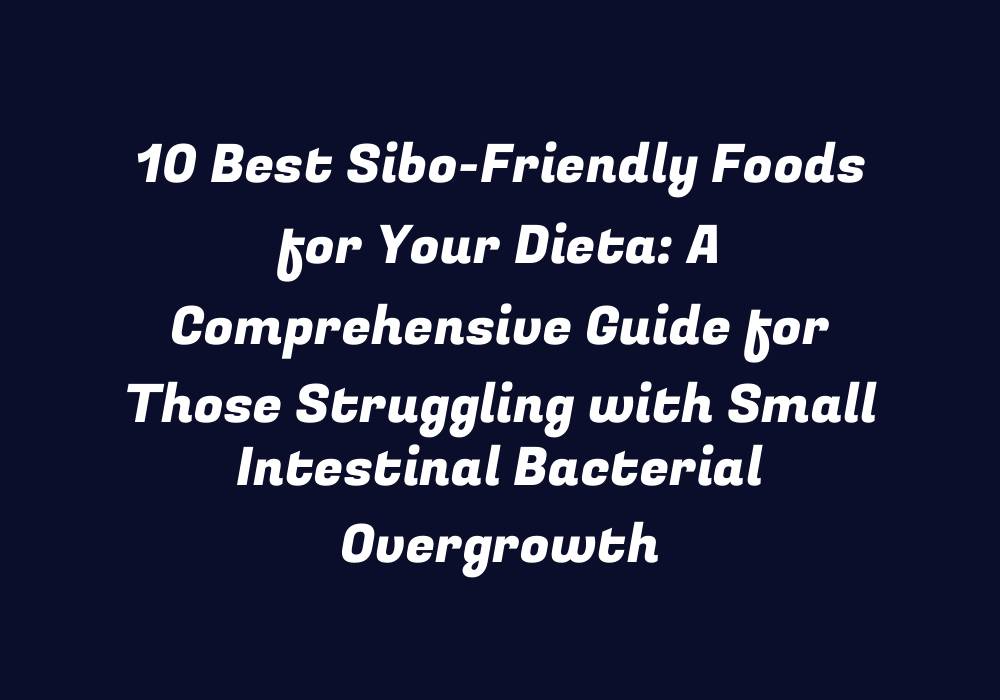Introduction to Sibo-Friendly Diet
Small Intestinal Bacterial Overgrowth (SIBO) is a condition characterized by excessive bacterial growth in the small intestine, which can cause various gastrointestinal symptoms and complications. A well-planned diet, focusing on Sibo-friendly foods, is essential for managing this condition. In this article, we’ve compiled ten of the best options to incorporate into your diet while dealing with SIBO, along with a comprehensive guide to help you navigate this process.
1. Fermented Foods
Fermentation is a process that breaks down food using beneficial bacteria and yeasts. Many fermented foods are low-FODMAP, meaning they have minimal levels of Fermentable Oligo-, Di-, Mono-saccharides And Polyols (short-chain carbohydrates), which can trigger SIBO symptoms. Examples include sauerkraut, kimchi, and miso. These foods contain probiotics that support a healthy gut microbiome.
2. Lean Proteins
Protein is an essential component of the diet, providing amino acids necessary for muscle growth and repair. However, some proteins may be difficult to digest, exacerbating SIBO symptoms. Instead, focus on lean sources like chicken, fish, turkey, egg whites, and low-lactose dairy products, such as Greek yogurt and kefir. These options are easier to digest while still providing the necessary nutrients.
3. Healthy Fats
Fats play a crucial role in supporting overall health and can help to reduce inflammation associated with SIBO. Opt for healthy fats from olive oil, coconut oil, avocados, nuts (except cashews), seeds, and fatty fish like salmon or mackerel. Limit your intake of processed oils, such as vegetable oil or margarine, to minimize irritation in the gut.
4. Fiber-Rich Foods
Fibers are important for gut health and can aid in digestion, but some individuals with SIBO may have trouble handling high fiber content. Therefore, select low-fiber fruits like berries and grapes, and low-fiber vegetables such as leafy greens, asparagus, or eggplant. Whole grain alternatives, such as quinoa or millet, are also beneficial for maintaining healthy gut bacteria and can be well-tolerated by many with SIBO.
5. Low FODMAP Carbohydrates
FODMAPs (Fermentable Oligo-, Di-, Mono-saccharides And Polyols) are a group of short-chain carbohydrates that can cause digestive issues in those with SIBO. Limit high FODMAP foods, such as onions, garlic, and wheat-based products, in favor of lower FODMAP options like sweet potatoes, white rice, or quinoa.
6. Anti-Inflammatory Foods
Many SIBO sufferers experience inflammation in their gastrointestinal system, so it is crucial to incorporate anti-inflammatory foods into your diet to help alleviate this symptom. This includes turmeric, green leafy vegetables, berries, and omega-3 fatty acids found in fatty fish or flaxseed oil. These choices can contribute to reducing inflammation and promoting a healthier gut environment.
7. Bone Broth
Bone broth is rich in collagen, amino acids, minerals, and other nutrients that support the gut lining. It provides essential nutrients without burdening the digestive system too much. This can help improve overall digestion and promote healing in those with SIBO.
8. Prebiotic-Rich Foods
Prebiotics are a type of dietary fiber that serve as food for healthy gut bacteria, supporting the growth of beneficial probiotics. Incorporate prebiotic-rich foods like bananas, artichokes, and garlic into your diet while managing SIBO symptoms. They can help balance the bacterial ecosystem in the small intestine and promote better digestion.
9. Spices
Spices provide various benefits for those with SIBO, such as enhancing the taste of food while also contributing to improved gut health. Ginger, cinnamon, and turmeric can aid in soothing inflammation, improving digestion, and offering antioxidant effects.
10. Herbs
Herbs like peppermint, chamomile, or fennel tea offer additional benefits for individuals with SIBO. They can help ease gastrointestinal discomfort, promote relaxation, and reduce bloating. Be cautious of their potential to interact with any medications you may be taking, and consult your healthcare provider if necessary.
Conclusion
Managing Small Intestinal Bacterial Overgrowth requires a well-rounded diet that accommodates both your nutritional needs and the condition’s unique requirements. By incorporating these ten Sibo-friendly foods, you can create a balanced meal plan while navigating your journey to better gut health and overall wellbeing. Remember to consult with your healthcare professional for personalized recommendations tailored to your specific situation.
